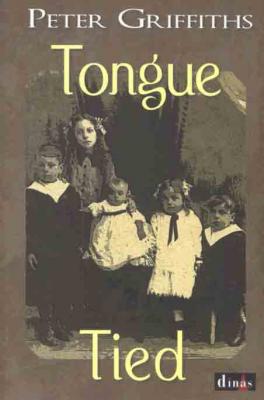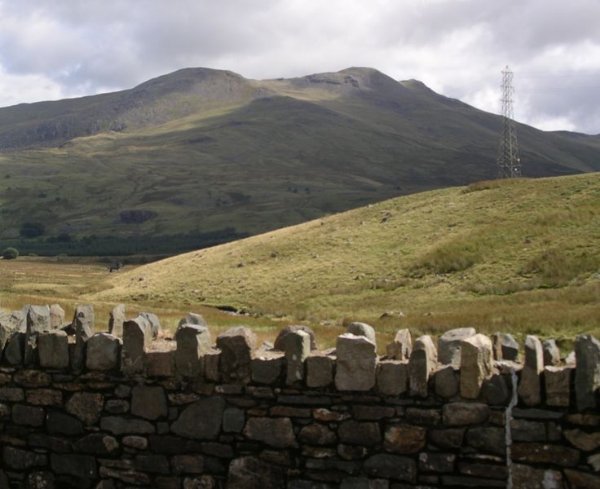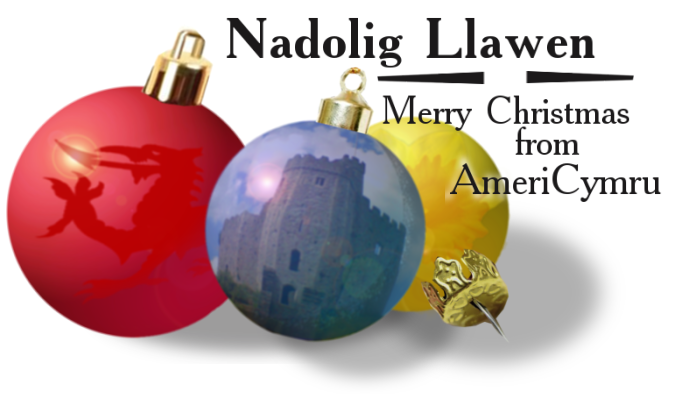|
This isn't really a top ten. But we hope you will enjoy this collection of snippets of performances from the comedians featured in our Christmas &New Year's Comedy Quiz . If you want to try the quiz it can be found here . But dont watch the videos first because you'll know all the answers:) Wherever you are and whatever you are doing tonight or on new years day we wish you a Happy New Year/ Blwyddyn Newydd Dda! 1. Griff Rhys Jones 2. Owen Money 3. Dawn French 4. Rhod Gilbert 5. Terry Jones 6. Paul Whitehouse 7. Max Boyce 8. Rob Brydon 9. John Sparkes 10. Tommy Cooper |
|
Peter Griffiths is the author of 'Tongue Tied' , a novel set in Bala and South Wales in the late 19th and early 20th centuries, which has proved enormously popular with Welsh American readers and is currently being reprinted by Y Lolfa. The book can be ordered direct fom their website:- 'Tongue Tied'
"Tongue Tied allows us to witness Welsh family life during the late nineteenth and early twentieth century, from the perspective of the farm and the coal pit, as we follow the lives and struggles of the Evans and Jones families. This is a powerful story that explores relationships, religion, language and identity - and how all these things can , ultimately, tear families apart." Americymru met and spoke with Peter about the book during a recent reading at the Clearing Cafe in Portland , Oregon. Americymru: Care to tell our readers a little about your background? We understand from the line-notes to 'Tongue-Tied' that you divide your time between Denver, Colorado and Llanelli. How did that come to be? Peter: I was born and bred in Cynheidre near Llanelli, schooled at Five Roads Primary, honed at Llandovery College, and finished off at Lincoln College, Oxford! My actuarial training funnelled me into the investment business, and eventually, a move to the States in 1972. Yvonne, my wife, is from Bala, and that's to where we gravitated when, in 1994, we began spending up to six months a year in Wales, supporting our families. Later, Swansea, gateway to Gower, became our base. Americymru: How did you come to write 'Tongue-Tied'? Peter: I self published an action novel, set in Denver, in 2000. Soon after, while driving from Heathrow to Bala, snaking up the Berwyn from Llangynnog, the beauty and grandeur of the Welsh countryside, for some reason, made a bigger impression than usual. During the ensuing wash of patriotism, I determined to set my next novel in Wales; it would glorify the country, the people, and their language; corny perhaps, but true. Americymru: 'Tongue-Tied' has enjoyed considerable success running to a second reprint in less than nine months. Do you have any plans for a second book? Peter: Tongue Tied was self published in 2004, set aside for a year or more, reorganized in 2006/2007, expertly edited for Y Lolfa by Elin Lewis in 2008, and published in time for St David's Day, 2009. In the meantime, I had been laying the groundwork for another novel, again set in Wales, but this time, not about Wales. Already, over a hundred pages have been penned, but since Tongue Tied's publication, I've been committed to its promotion. My plan is to return to my new novel early in 2010. Americymru: The book is set in both North and South Wales and much is made of the language divide between the two societies. How serious a problem do you think this is for modern Wales and what might be done to overcome it? Peter: The massive migration into SE Wales, first from the rest of Wales and then from outside the country, set up a society and culture which was at odds with the rural, non-conformist driven, Welsh-speaking one which previously had prevailed. So, whatever divide existed, had not sprung from the language alone. In support of Tongue Tied's plot, I chose to focus on the language, and in particular, two issues related to it; first, the fear among many non-Welsh speakers that in an independent Wales, Welsh speakers would hold the upper hand; and second, the feeling among many Welsh speakers that South Walians had given up their mother tongue rather too readily. Tongue Tied may have exaggerated these feelings, and certainly these days, they are nowhere near as potent. As you know, it's now chic to be Welsh speaking, and non-Welsh speaking parents encourage their children to learn the language. Americymru: The novel is partly set in Tryweryn which was flooded to make a reservoir in 1965. Is there any political significance in this choice of setting? Peter: Tongue Tied was conceived in 2000/2001. My notes are lost and by now, I'm unclear on the various stages of the novel's development. It made sense to me, however, that the North Walian action should be set near Bala, and for sure, Arenig Fawr featured from the start. Tryweryn and Capel Celyn nestle in the mountain's shadow, so it seemed natural that they should feature as well. Looking back, I am somewhat surprised that Tryweryn's symbolism did not deter me from setting Tongue Tied in the valley. By now, however, it seems to me that the more who are aware of Capel Celyn and its community, the better. Tongue Tied does not deal with the politics of Tryweryn, but its significance is recognized in Author's notes. Americymru: Did you have a particular audience that you hoped for the book? Is there anything in particular you'd like people to take away from reading it? Peter: To a large degree, Tongue Tied was aimed at my circle of acquaintances in the States who go ga-ga over anything Scottish or Irish, but rarely if it's Welsh. Feedback has been encouraging; for example, one well read critic commented that while she read Tongue Tied, she felt as if she was on holiday in Wales. Several others, after reading Tongue Tied, have assured me that they just have to visit the land of my fathers. Americymru: What do you see as the central message of the book? Does it have a moral? Peter: Originally, one of my objectives was to highlight the relentless interference in Welsh affairs by the English. Gradually, the anti English slant was watered down, but it comes through, nevertheless. Also, Tongue Tied focusses on the unifying effect the Welsh language has had on the nation over time, but observes with sadness that at times over the last one hundred and fifty years, it's also been divisive. Finally, despite Tongue Tied's several unreasonable characters, the novel overall espouses toleration and sensitivity to others. Americymru: You've lived in the USA and Wales, how well do you think Wales is represented in North America? Do you have any opinion on whether or how it could be better represented? Peter: I don't have an opinion as to how well Wales is represented in North America. Clearly, the weight of numbers favor the Irish and Scottish, but I've been impressed by the enthusiasm shown at Welsh gatherings, including the recent Gymanfa Ganu in Pittsburgh. Americymru: What do you feel the two countries' cultures have to offer each other? How are they different? Peter: What can one say about the two cultures? Leave well alone, I say. There's no doubt I feel completely different when I'm in Swansea. I love being by the sea, and Denver couldn't be further from it. Swansea is still a bit of a frontier town...certainly when compared to Cardiff...and all of life is there, whereas in Denver we live a more socially sheltered life. As you know, nothing is bought in the States. Everything is sold, and Wales isn't quite at that point yet; I find that refreshing. One thing the two countries have in common is that they were both English colonies; unfortunately, one of them still is. Americymru: Do you have any plans for reading or speaking tours or public engagements that we should be aware of? Peter: Since Tongue Tied was published just before March 1st of this year, I've devoted all my energies to its cause. That will change in the new year as I return to my new novel. We are committed over the next several months to many book clubs who will read Tongue Tied, and who knows, something may surprise us on another front, but no longer will I be breathing Tongue Tied day and night. Americymru: Any final message for the readers and members of Americymru? Peter: In conclusion, I'd like to comment on Tongue Tied's style. It is heavily influenced by Cynghanedd, that ancient and very strict Welsh poetic form, which is based on alliteration, internal rhyme, and correspondence of consonants. Consequently, Tongue Tied abounds in alliterations and poetry within prose. For example, " Sadness and silence are sisters, and so for a while all was quiet, but for the distant bleating of mother and child, stonechats and pipits and hawks in the wild, and the restrained sipping of tea." Arenig Fawr in North Wales, close to which much of the action in the novel is set.
|
Christmas Musical Bonus - Hear 'Nos Galan' ( Deck the Halls ) Played on the Crwth
By Ceri Shaw, 2018-12-18
From the Wikipedia :- " Deck the Halls" (original English title: "Deck the Hall") is a traditional Yuletide and New Years' carol. The "fa-la-la" refrains were probably originally played on the harp. The tune is Welsh dating back to the sixteenth century, and belongs to a winter carol, Nos Galan.
The tune is that of an old Welsh air, first found in a musical manuscript by Welsh harpist John Parry Ddall (c. 17101782), but undoubtedly much older than that. The composition is still popular as a dance tune in Wales, and was published in the 1784 and 1794 editions of the harpist Edward Jones's Musical and Poetical Relics of the Welsh Bards. Poet John Ceiriog Hughes wrote the first published lyrics for the piece in Welsh, titling it "Nos Galan" ("New Year's Eve"). A middle verse was later added by folk singers. In the eighteenth century the tune spread widely, with Mozart using it in a piano and violin concerto and, later, Haydn in the song "New Year's Night.
Originally, carols were dances and not songs. The accompanying tune would have been used as a setting for any verses of appropriate metre. Singers would compete with each other, verse for verse known as canu penillion dull y De ("singing verses in the southern style"). The church actively opposed these folk dances. Consequently, tunes originally used to accompany carols became separated from the original dances, but were still referred to as "carols". The popular English lyrics for this carol are not a translation from the Welsh."
The above version ( together with many other tracks ) is performed by Dr J.Marshall Bevil on the Welsh traditional instrument - the crwth. Linked below is a three part interview with Dr Bevil about the instrument:-
...
Master of The Crwth - Digon o Grwth Part 1
Master of The Crwth - Digon o Grwth Part 2
Master of The Crwth - Digon o Grwth Part 3
...
|
Heroes Lager to raise 1million for Forces Charities A new premium bottled lager is to be launched in February 2010 to help raise more than 1million a year for forces charities - and to help provide long-term care for our Nations Heroes. Heroes Lager is being launched by a not-for-profit company called Beer Brands, which has announced that Afghan Heroes will be one of the first charities to benefit. Beer Brands is owned by Waless oldest brewing family and the company will donate all profits after cost from the sales of the lager to four military charities. The other charities will be announced over the next few weeks. Simon Buckley, sixth generation of the world famous Buckley brewing family, said: This lager is being brewed to the very highest standards and will become one of the nations favourites. Our aim is to raise significant amounts of money for the charities by making this lager widely available, and to give the consumer an easy opportunity to support our Nations Heroes. This new product will be available throughout the UK in supermarkets, pubs and off-licences and will cost no more than other well known brands. Heroes Lager will have broad market appeal to those serving in the forces, their families, and the millions of UK citizens who really want to help the nations armed forces personnel. We are convinced that this product is going to raise significant sums for the charities, and become a highly popular lager brand. Denise Harris, founder of Afghan Heroes and whose son Corporal Lee Scott died in Afghanistan in July 2009, said: Were delighted to be associated with this new lager and hope it will generate significant funds for our charity. Not only will people be able to support those affected by the conflict in Afghanistan, they will be able to raise a glass in honour of those who have given the ultimate sacrifice. Afghan Heroes was set up by a band of mothers who lost their sons in the bloodiest 24 hours to date of the Afghanistan war in July 2009. Their mission is to establish a support network so that those who have lost loved ones due to the conflict know there is someone who can help them get over their loss. The mothers have also raised funds to send a box of goods to every front line solider currently serving in Afghanistan. For further information please visit www.afghanheroes.org.uk
|
|
The end of 2009 is upon us all and time to make any last-minute, tax-deductible donations you may need to make this fiscal year! We urge you to consider the Meriwether Lewis Memorial Eisteddfod Foundation , the non-profit corporation created to put on the Left Coast Eisteddfod . In 2009, we presented our inaugural event, not without its growing pains but still successful for our first year. Niall Griffiths, Chris Keil and Chris Needs appeared at our first authors' event and read from their work to a very appreciative audience at the Portland Central Library as part of Welsh Literature Month in the library system. Chris Needs charmed the mayor of Portland, Sam Adams, and seminars and readings at the event were very well received and we've gotten a lot of great feedback. With the 2010 ( Oct 3rd -10th ) event, we plan to repeat and expand on the success of the author's events. Both Chris Keil and Niall Griffiths have kindly said they'll come back and we hope to add more authors to this list. We're looking at possibly adding film and live theater to 2010's events, as well as educational components 1) Sponsorship: do you have a business based in Wales or a Welsh or Celtic-related business here in the US? If so, please consider advertising with AmeriCymru. We are particularly concerned to work with accomodation providers, tour companies, cultural, artistic and technologies ventures. Contact Ceri Shaw or Gaabriel Becket to create your tailored sponsorship package at americymru@gmail.com. Act now to ensure maximum exposure. 2) Donations: Anything you donate to our non-profit corporation, the Meriwether Lewis Memorial Eisteddfod Foundation, can be claimed as a tax-exempt donation on your 2009 taxes. Every cent you donate will be used to make the Eisteddfod a bigger and better occasion and to prepare similar future events. There is a donate button which pays directly into the Foundation bank account at the top of the left hand column on every page of the site. Any amount, great or small, is appreciated. If you do not feel comfortable using the PayPal donate button, please do not hesitate to contact us at americymru@gmail.com to make alternative arrangments. ALL DONATIONS ON BOTH THE AMERICYMRU AND MLMEF SITES GO TOWARD FINANCING THE 2010 LEFT COAST EISTEDDFOD ( OCT 3-10 2010 ). WE LOOK FORWARD TO HEARING FROM YOU AND SEEING YOU ALL AT THE LEFT COAST EISTEDDFOD IN PORTLAND NEXT YEAR. DIOLCH YN FAWR, AMERICYMRU!
|
- Five Great Bars
- Games Room - including full size snooker tables, skittles and darts
- Two Large Screens With Satellite Sports
- Free Broadband
- Large Entertainment Hall (available for private hire)
- Also Introducing The New And Exclusive - Bar Cymraeg!
| Don't forget to pre-book your lift to the ENTERTAINMENT CENTRE here at the GREENFLY with TOP-KAT TRAVEL 02920 886117 |




















